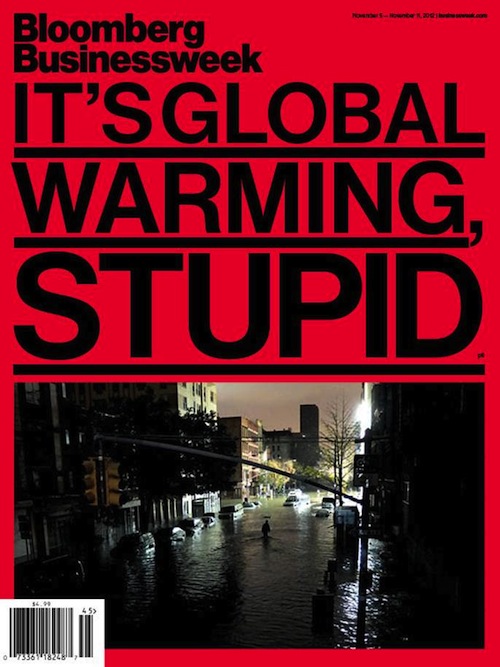All it took was a major catastrophe on the eastern seaboard, but we’re finally starting to talk about the effect of climate change on weather. Love this cover on BloombergBusinessweek, and it’s been very reassuring to see more and more recent news stories making the connection between Hurricane Sandy and Climate Change (better late than never).
The article begins:
Yes, yes, it’s unsophisticated to blame any given storm on climate change. Men and women in white lab coats tell us—and they’re right—that many factors contribute to each severe weather episode. Climate deniers exploit scientific complexity to avoid any discussion at all.
Scientists have had a hard time making the argument for climate change because they’ve been worried about being precise – since you can’t draw a direct causal link between climate change and any one weather incident, they use caveats and language that belies the urgency of the situation. But scientists are getting looser with language and more often are dropping the caveats, and getting at the issue in a more direct way.
An unscientific survey of the social networking liter moodature on Sandy reveals an illuminating tweet (you read that correctly) from Jonathan Foley, director of the Institute on the Environment at the University of Minnesota. On Oct. 29, Foley thumbed thusly: “Would this kind of storm happen without climate change? Yes. Fueled by many factors. Is storm stronger because of climate change? Yes.” Eric Pooley, senior vice president of the Environmental Defense Fund (and former deputy editor of Bloomberg Businessweek), offers a baseball analogy: “We can’t say that steroids caused any one home run by Barry Bonds, but steroids sure helped him hit more and hit them farther. Now we have weather on steroids.”
In an Oct. 30 blog post, Mark Fischetti of Scientific American took a spin through Ph.D.-land and found more and more credentialed experts willing to shrug off the climate caveats. The broadening consensus: “Climate change amps up other basic factors that contribute to big storms. For example, the oceans have warmed, providing more energy for storms. And the Earth’s atmosphere has warmed, so it retains more moisture, which is drawn into storms and is then dumped on us.” Even those of us who are science-phobic can get the gist of that.
See also this article at The Huffington Post where George Lakoff suggests we start popularizing the use of the term Systemic Causation to describe the connection between extreme weather and climate change:
Systemic causation is familiar. Smoking is a systemic cause of lung cancer. HIV is a systemic cause of AIDS. Working in coal mines is a systemic cause of black lung disease. Driving while drunk is a systemic cause of auto accidents. Sex without contraception is a systemic cause of unwanted pregnancies.
There is a difference between systemic and direct causation. Punching someone in the nose is direct causation. Throwing a rock through a window is direct causation. Picking up a glass of water and taking a drink is direct causation. Slicing bread is direct causation. Stealing your wallet is direct causation. Any application of force to something or someone that always produces an immediate change to that thing or person is direct causation. When causation is direct, the word cause is unproblematic.
Systemic causation, because it is less obvious, is more important to understand. A systemic cause may be one of a number of multiple causes. It may require some special conditions. It may be indirect, working through a network of more direct causes. It may be probabilistic, occurring with a significantly high probability. It may require a feedback mechanism. In general, causation in ecosystems, biological systems, economic systems, and social systems tends not to be direct, but is no less causal. And because it is not direct causation, it requires all the greater attention if it is to be understood and its negative effects controlled.
Above all, it requires a name: systemic causation.
